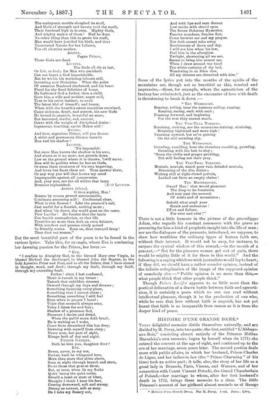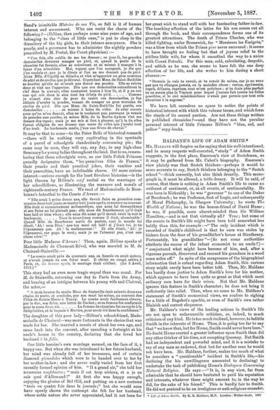HISTOIRE DUNE GRANDE DAME.*
THERE delightful memoirs divide themselves naturally, and are divided by M. Perey, into two parts ; the first, entitled " L'Abbaye- aux-Bois," consisting almost entirely of the Princess Relkne Massalska's own memoirs, begun by herself when (in 1771) she entered the convent at the age of eight, and continued up to the eve of her marriage, seven years later. The second portion deals more with public affairs, in which her husband, Prince Charles de Ligne, and her father•in-law (the " Prince Charming" of his time) took an active part ; it tells, also, the story of her life as a great lady in Brussels, Paris, Vienna, and Warsaw, and of her connection with Count Vincent Potocki, the Grand Chamberlain of Poland,—her marriage to whom, after her first husband's death in 1792, brings these memoirs to a close. The little Princess's account of her girlhood almost reminds tis of George • Hittoire d'uns Errands Dame. Par M. Perey. 1 vol. Paris :
Sand's inimitable Ilistoire de ma Vie, so full is it of human interest and amusement. Who can resist the charm of the following ?— (Helene, then perhaps some nine years of age, and belonging to the "class of little ones," is put to sleep in the dormitory of the big girls, to their intense annoyance. She is poorly, and a governess has to administer the nightly powders prescribed by M. Portal, the Court physician) :—
" thee foie, elle oublia de me lee dormer; se jour-le, lee grandee demoiselles devaient manger no pate, et, (vend is ports de Is &sombre fat fermee, cuss se releverent et se mirent in manger A. la lama: d'an reverbere. Moi, voyant que l'on mangeeit, je die que j'en vonlais et,que je is :Muds ei ion ne me donneit pee do piste. Akre Mlle. d'Egailly se detacba et viol m'apporter un groe moreena de pAt6 et de croitte, que je devorai. Cependant Mme. de Saint-Bathilde se sonnet qn'elle ne m'avait pee donne ma poudre. Elle se releva done et vint me l'apporter. Des quo oee demoiselles entendirest la clef dans la eerrare, ellee ointment testes it lour lit, et il y en eat
use qui mit dans le Men tont lee debris do piste Comme je u'osait rien dire de pour de trahir oes demoiselles, je fun obligee d'avaler is poudre, venant de manger en grog moreean de crofite de pate. Des quo Mme. do Saint-Bathilde fat partie, oes
demoiselles se mirent A boire du cidre. Je criai encore pour cm'on m'en donnfit, ales ne Is vonlaient pas, pareeque je venaie de prendre one pondro, et mime Mlle. de la BoehcAymen Tint me dormer des tapes; male je me min si fort I pleurer, qu'e is fin elles furent obligees de me donner nne verre de cidre qua j'avalai tout d'an trait. Le lendemain matin, j'eus use fievre de choral."
It may be that to some—to the Peter Bells of historical research —there will be nothing very captivating in the spectacle of a parcel of schoolgirls clandestinely consuming pie ; the same may be seen, they will say, any day, in any high-class Seminary for young ladies throughout the land. Bat tone, remem- bering that these schoolgirls were, as our little Polish Princess proudly designates them, "lee premieres filles de France," their pranks and their practical jokes, their vanities and their precocities, have an indefinable charm. Of more serious interest—serious enough for the least frivolous historian—is the light thrown by Helene's nail recital on the marriages of her schoolfellows, as illustrating the manners and morals of eighteenth-century France. We read of Mademoiselle de Boar- bonne's betrothal to the Comte d'Avaux
"Elle avait A peke douse ans, elle derail faire sa premiere com- munion dans: bait jotwe, se marier bait jours spree, et rentrer an convent. Elle Unit si excessivement melaneolique, quo none dui demendAmes si son fatal: ne lui plaisait pas; elle nous dit franchement qu'il Mak biers laid et bias rieto ; e11e none dit 8.681 qu'il derail venir is voir le
lendemain Nous le tronvamee comma it stall, abominable ! Quand Mlle. de Bourbonne sortit du parloir, teat le monde lai
Ah ! mon Dieu! que ton marl est laid si retail] toi, je ne reponserais pas. Al ! la malbeureme ! ' Et elle disait, Ab ! je Pepoueerai, car papa le vent ; main je ne Faimerai pas, c'est use chose silre.' "
Poor little Madame d'Avaux ! Then, again, Helene speaks of Mademoiselle de Clermont-Revel, who was married to M. de Choiseul-Stainville :-
" Le comte avail pros de gnarante ane, as fiancee en avail quince, at n'avait jamais re son (slur marl. Il obtint on conga, arriva Paris, et, six heures apras, Is mariage emit celebre. (Le 3 Avril, 1761.) "
This story had an even more tragic sequel than was usual. For M. de Stainville, returning one day to Paris from the Army, and hearing of an intrigue between his young wife and Clairval, the actor,-
" A kola bermes du matin Mme. de Stainville etait enleree dans use chaise de poste, et condnite, par son marl lai-memo, an convent dee Filles de Sainte-Marie it Nancy. Le comte avail keilement obtenn, par le due, son frere, nne lettre de Cachet ; et sa femme fat renfermee pour le rests de ea vie. . . . . . La femme de chambro fat envoy& is la Saltpetriere, et lo lammis A Bieetre, pour avoir ate dans la confidence."
The daughter of this poor lady—Hel'en's school-friend, Made- moiselle de Choiseul—was more fortunate in the choice that was made for her. She married a cousin of about her own age, and came back into the convent, after spending a fortnight at his uncle's house in the country, declaring that she loved her husband u la folio.
Our little heroine's own marriage seemed, on the face of it, a happy one. But when she was introduced to her future husband, her mind was already fall of her trousseau, and of certain diamond girandoles which were to he handed over to her by her mother-in-law ; and she never really varied from her first casually formed opinion of him. "II a grand air," she told her numerous confidantes; " Untie il eat trop serieux, et a je ne sale quoi d'Allemand I" At first she was happy enough, enjoying the glories of Bel Eil, and putting on a new costume " trois on quatre foie dens la journee;" but she would soon have openly shown the contempt she felt for her husband, whose noble nature she never appreciated, had it not been for her great wish to stand well with her fascinating father-in-law. The touching affection of the latter for his son comes out all through the book, and their correspondence forms one of its greatest attractions. The death of Prince Charles, who was killed fighting, under Brunswick, for "Messieurs lea 2migres." was a blow from which the Prince pare never recovered : it seems to have brought no feeling but that of joyous relief to the pitiless little wife, for whom it smoothed the way to a union with Count Potocki. For this man, cold, calculating, despotic, and selfish as he was, she seems to have felt the one deep affection of her life, and she writes to him during a abort absence:— " Domain je vale to revoir, et to revoir de mime, car je ee veux pas quo In changes jamais, en Is moindre chose : vertue, egremente, esprit, defeats, caprices, tont m'est preoionx ; si to Mak plus parfait to ne sends pins le Vincent pour lequel j'aurais fait tomes lea folios poseibles, si is del miseriaordieux n'avait pas permis quo tont cola abontisse It la sagesse."
We have left ourselves no apace to notice the points of historical interest with which this volume teems, and which form the staple of its second portion. Are not these things written in published chronicles ?—and they have not the peculiar personal interest of little Princess Helen's " blno, red, and yellow" copy-books.



















































 Previous page
Previous page